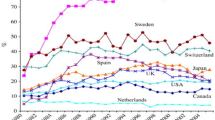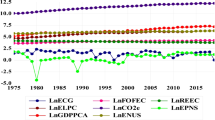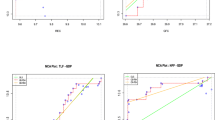Abstract
This paper analyzes the dynamics and quantitative relationships between renewable energy production, nuclear energy production and economic growth on the basis of quarterly data from 2001Q1 to 2012Q3 in France. We employ unit root tests, the augmented Dickey–Fuller and the Philips–Perron, Granger causality test and variance decompositions to uncover the extent and the magnitude of the relationship among variables. The econometric evidence seems to suggest that there is a unidirectional relationship between the economic growth and the nuclear electricity production, since the growth hypothesis is valid. While there is a unidirectional causality at short-term running from the renewable energy production to the primary production of all energies at 10 % level.
Similar content being viewed by others
References
Adamantiades A, Kessides I (2009) Nuclear power for sustainable development: current status and future prospects. Energy Policy 37:5149–5166
AL-Iriani MA (2006) Energy–GDP relationship revisited: an example from GCC countries using panel causality. Energy Policy 34(17):3342–3350
Altinay G, Karagol E (2005) Electricity consumption and economic growth: evidence from Turkey. Energy Econ 27:849–856
Apergis N, Payne JE (2009) Energy consumption and economic growth in Central America: evidence from a panel cointegration and error correction model. Energy Econ 31:211–216
Apergis N, Payne JE (2010) A panel study of nuclear energy consumption and economic growth. Energy Econ 32:545–549
Bard D, Verger P, Hubert P (1997) Chernobyl, 10 years after: health consequences. Epidemiol Rev 19:187–204
Belloumi M (2009) Energy consumption and GDP in Tunisia: cointegration and causality analysis. Energy Policy 37:2745–2753
Bowden N, Payne JE (2010) Sectoral analysis of the causal relationship between renewable and non-Renewable energy consumption and real output in the US. Energy Sour Part B 5(4):400–408
Cheng B (1995) An investigation of cointegration and causality between energy consumption and economic growth. J Energy Dev 21:73–84
Dambrine F (2006) Rapport sur les perspectives de développement de la production hydroélectrique en France
De Montesquiou A (2000) L’énergie nucléaire: union ou confusion ? Les Rapports du Sénat, 320
Dees S, Mauro DF, Pesaran MH, Smith LV (2007) Exploring the international linkages of the Euro area: a global VAR analysis. J Appl Econ 22:1–38
Dickey D, Fuller W (1979) Distribution of the estimator for autoregressive time series with a unit root. J Am Stat Assoc 74:427–431
Diebold FX, Yilmaz K (2009) Measuring financial asset return and volatility spillovers, with application to global equity markets. Econ J 119:158–171
Diebold FX, Yilmaz K (2012) Better to give than to receive: predictive directional measurement of volatility spillovers. Int J Forecast 28:57–66
Enders W (2004) Wiley series in probability and mathematical statistics. Applied econometric time series.Wiley, New York. http://epp.eurostat.ec.europa.eu/portal/page/portal/statistics/search_database
Fatai K, Oxley L, Scrimgeour F (2002) Energy consumption and employment in New Zealand: searching for causality. Paper presented at NZAE conference, Wellington
Fiore K (2006) Nuclear energy and sustainability: understanding ITER. Energy policy 34(17):3334–3341
Gao TM (2009) Methods of econometric analysis and demonstration modeling. Application and Examples of EViews, 2nd edn. Tsinghua University Press, Beijing (in Chinese)
Granger CWJ (1969) Investigating causal relations by econometric models and cross-spectral methods. Econometrica 37:424–438
Jbir R, Zouari-Ghorbel S (2009) Recent oil price shock and Tunisian economy. Energy Policy 37(3):1041–1051
Jobert T, Karanfil F (2007) Sectoral energy consumption by source and economic growth in Turkey. Energy Policy 35:5447–5456
Kraft J, Kraft A (1978) On the relationship between energy and GNP. J Energy Dev 3:401–403
Lee CC, Chang CP, Chen PF (2008) Energy-income causality in OECD countries revisited: the key role of capital stock. Energy Econ 30:2359–2373
Mantalos P, Shukur G (2010) The effect of spillover on the Granger causality test. J Appl Stat 37(9):1473–1486
Marques AC, Fuinhas JA (2012) Is renewable energy effective in promoting growth? Energy Policy 46:434–442
Masih AMM, Masih R (1997) On temporal causal relationship between energy consumption, real income and prices; some new evidence from Asian energy dependent nics based on a multivariate cointegration/vector error correction approach. J Policy Model 19:417–440
Mazbahul GAAND, Nazrul AKM (2011) Electricity consumption and economic growth nexus in Bangladesh: revisited evidences. Energy Policy 39:6145–6150
Mehrara M (2007) Energy consumption and economic growth: the case of oil exporting countries. Energy Policy 35(5):2939–2945
Menegak AN (2011) Growth and renewable energy in Europe: a random effect model with evidence for neutrality hypothesis. Energy Econ 33:257–263
Menyah Kojo, Wolde-Rufael Yemane (2010) CO2 emissions, nuclear energy, renewable energy and economic growth in the US. Energy Policy 38:2911–2915
Murry DA, Nan GD (1996) A definition of the gross domestic product_electrification interrelationship. J Energy Dev 19:275–283
Narayan PK, Smyth R (2005) Electricity consumption, employment and real income in Australia evidence from multivariate Granger causality tests. Energy Policy 33:1109–1116
Narayan PK, Smyth R (2008) Energy consumption and real GDP in G7 countries: new evidence from panel cointegration with structural breaks. Energy Econ 30:2331–2341
Oh W, Lee K (2004) Causal relationship between energy consumption and GDP: the case of Korea 1970–1999. Energy Econ 26(1):51–59
Ozturk I (2010) A literature survey on energy-growth nexus. Energy Policy 38:340–349
Pao HT, Fu HC (2013) Renewable energy, non-renewable energy and economic growth in Brazil. Renew Sust Energ Rev 25(2013):381–392
Paul S, Bhattacharya RN (2004) Causality between energy consumption and economic growth in India: a note on conflicting results. Energy Econ 26(6):977–983
Payne JE (2011) On biomass energy consumption and real output in the US. Energ Sour B: Econ Plann Policy 6:47–52
Pesaran MH, Shin Y (1998) Generalized impulse response analysis in linear multivariate models. Econ Lett 58:17–29
Phillips P, Perron P (1988) Testing for a unit root in time series regression. Biometrica 75:335–346
Pirlogea C, Cicea C (2012) Econometric perspective of the energy consumption and economic growth relation in European Union. Renew Sustain Energy Rev 16:5718–5726
Pokharel SH (2006) An econometrics analysis of energy consumption in Nepal. Energy Policy 34:1–12
Sadorsky P (2009) Renewable energy consumption and income in emerging economies. Energy Policy 37:4021–4028
Salim RA, Rafiq S (2012) Why do some emerging economies proactively accelerate the adoption of renewable energy? Energy Econ 34:1051–1057
Sari R, Ewing BT, Soytas U (2008) The relationship between disaggregate energy consumption and industrial production in the United States: an ARDL approach. Energy Econ 30:2302–2313
Sims C (1980) Macroeconomics and reality. Econometrica 48:1–48
Stern DI (2000) A multivariate cointegration analysis of the role of energy in the US macroeconomy. Energy Econ 22:267–283
Stern D (2011) The role of energy in economic growth. Ecol Econ Rev 1219:26–51
Sung B, Song W-Y (2013) Causality between public policies and exports of renewable energy technologies. Energy Policy 55:95–104
Suri M, Huld TA, Dunlop ED (2005) PV-GIS: a web-based solar radiation database for the calculation of PV potential in Europe. Int J Sustain Energy 24(2):55–67
Troen I, Petersen EL (1989) European wind atlas. Risø National Laboratory, Roskilde
Vaillancourt K, Labriet M, Loulou R, Waaub J (2008) The role of nuclear energy in long-term climate scenarios: ananalysis with the World-TIMES model. Energy Policy 36:2086–2097
Wolde-Rufael Yemane, Menyah Kojo (2010) Nuclear energy consumption and economic growth in nine developed countries. Energy Econ 32(3):550–556
EDF http://energie.edf.com/nucleaire/carte-des-centrales-nucleaires-45738.html
SER Programme Mondial pour l’Évaluation des Ressources en Eau(WWAP), ademe, ministère écologie, EDF. sfen: www.sfen.org/la-france-et-le-choix. Statistics Database-Eurostat
World Nuclear Association (WNA) http://www.world-nuclear.org/info/Country-Profiles/Countries-A-F/France/#.UelpKNJM-rr
Yuan J, Kang J-G, Zhao C, Hu Z (2008) Energy consumption and economic growth: evidence from China at both aggregated and disaggregated levels. Energy Econ 30:3077–3094
Author information
Authors and Affiliations
Corresponding author
Rights and permissions
About this article
Cite this article
Mbarek, M.B., Khairallah, R. & Feki, R. Causality relationships between renewable energy, nuclear energy and economic growth in France. Environ Syst Decis 35, 133–142 (2015). https://doi.org/10.1007/s10669-015-9537-6
Published:
Issue Date:
DOI: https://doi.org/10.1007/s10669-015-9537-6




